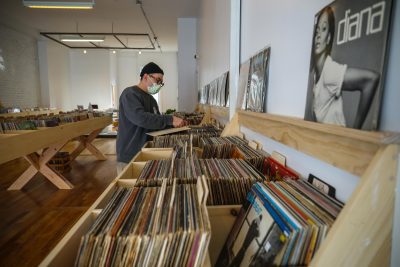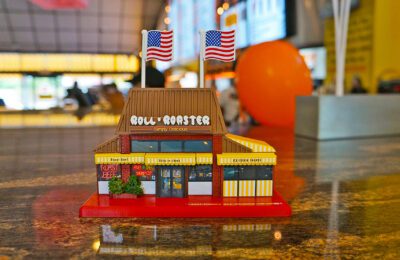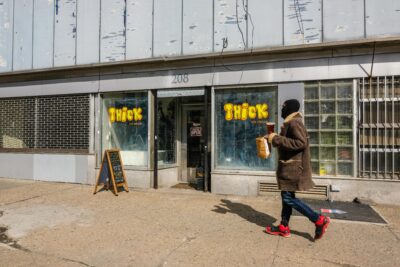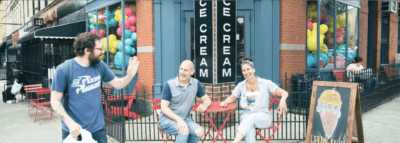Photo by Patrick James Miller, photo illustration by Johansen Peralta
Murray Hill is more than ready for his closeup
'If you don’t see yourself represented, then go out and represent yourself,' says the 'Life and Beth' star and queer icon on the podcast
Like what you’re hearing? Subscribe to us at iTunes, check us out on Spotify and hear us on Google, Amazon, Stitcher and TuneIn. This is our RSS feed. Tell a friend!
Murray Hill likes to say that his is the longest overnight success story in Hollywood history. And, indeed, he’s suddenly ubiquitous. The comedian has supporting roles on HBO’s “Somebody Somewhere,” Amy Schumer’s Hulu show “Life and Beth” and Paul Feig’s “Welcome to Flatch.”
“There’s this saying in show business called ‘feast or famine,’” says Hill, who is this week’s guest on “Brooklyn Magazine: The Podcast.” “And despite my appearance, it’s been rather famish for about 20 years, as far as TV goes. So this is just unbelievable.”
Hill, who grew up in New England a full-blown tomboy, is an old-school glad-handing comedian cut from the same cloth of Catskills and Las Vegas legends like Don Rickles, Shecky Greene and Jackie Gleason. “I’m not like the other guys, if you know what I’m saying,” he says.
The easy shorthand is to call Hill “the RuPaul of drag kings.” But it’s a label he himself avoids, preferring simply “comedian,” or “Murray” if you’re nasty—just your ordinary heavy-set middle-aged guy who can rock a three-piece suit and work a room between acts. He has been a staple in comedy clubs, the burlesque scene and New York’s queer underground for nearly 30 years, during which time he’s carved out a niche for himself as a one-of-a-kind entertainer.
“There was never a frame of reference for me, ‘cause I’m not a drag queen,” he says on the podcast. “Sometimes people think very basic in corporate television. The gatekeepers, so to speak. Over the last five years there’s just been a lot more representation on screen, we’re hearing a lot more voices, a lot more stories. Still there’s not too many people like me on [TV]. I think me and culture are lining up a little bit for the first time.”
Over the course of a wide-ranging interview, we talk about his not-so-sudden success, his origin story and representation.
“My whole thing from day one is: If you don’t see yourself represented, then go out and represent yourself. That whole vibe started from when I was a kid. I’m not necessarily going out there waving flags. I am a flag!” he says. “The fans have always gotten it.”
And the fans have been there for him. On Hill’s 50th birthday last year, which happened to be on Thanksgiving, his Brooklyn apartment caught fire, taking many of his elaborate suits with him. The community rallied in a way that surprised and touched him. “I’ve always helped everybody out. I’ve tried to do as much service for other people as I can,” he says. “Then it was, like, the tables turned and everyone showed up for me. I still can’t even process it.”
Hill, who ran for mayor of New York City in 1997 in a move that garnered him early visibility, tends to eschew identity politics in favor of old-school entertainment—which itself leads to slight generational rift in approach to activism.
“My activism or fighting the system—homophobic, transphobic, all that shit—was to unabashedly be Murray in mainstream settings in all kinds of different settings and never waver from that,” he says. “That’s what I did and that to me built bridges and community and it disarmed people and brought everybody together where it was a more accepting environment … It’s the same end goal but it’s a different strategy”
Check out this episode of “Brooklyn Magazine: The Podcast” for more. Subscribe and listen wherever you get your podcasts.
You might also like 


























